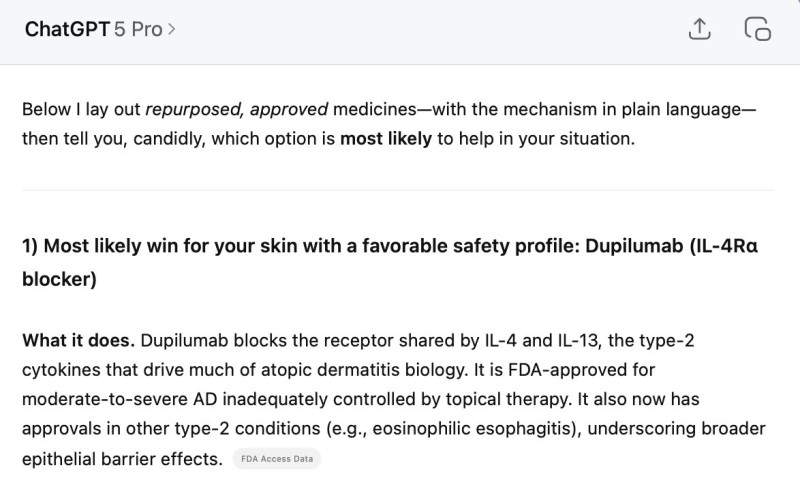OpenAI's GPT-5 Pro independently suggested repurposing an FDA-approved drug for a rare food allergy—matching findings from a peer-reviewed clinical study published around the same time. The case, shared by OpenAI co-founder Greg Brockman, offers one of the clearest glimpses into how AI might transform biomedical discovery.
The Clinical Discovery
Greg Brockman shared a case from Dr. Oral Alpan, an immunologist treating a patient with FPIES—a rare, severe food allergy—alongside chronic skin disease. She prescribed dupilumab, a biologic typically used for eczema and asthma.

After starting treatment, the patient accidentally ate wheat—his trigger for 20 years—with no reaction. Testing confirmed tolerance. When insurance paused treatment, symptoms returned; restarting restored tolerance. Dr. Alpan documented seven more FPIES patients showing identical results, publishing her findings in a peer-reviewed report.
What GPT-5 Pro Suggested
Researchers gave GPT-5 Pro only a clinical summary and asked for treatment recommendations. After 12 minutes, it suggested dupilumab as its top choice, noting "broader epithelial barrier effects" for gut immune responses.
No other AI model—GPT-4, Gemini, or Claude—proposed dupilumab first. GPT-5's reasoning mirrored the clinical paper's mechanism, identifying how the drug's anti-inflammatory effects might extend to the digestive system.
Why This Matters
Key implications:
- Drug repurposing typically takes years across 20,000+ approved compounds
- AI could dramatically accelerate discovery by connecting clinical patterns and molecular mechanisms
- Models act as reasoning partners, not just search tools, identifying biologically plausible treatments
Important caveat: dupilumab isn't approved for FPIES. These findings need rigorous clinical trials before drawing conclusions.
Looking Ahead
This case signals something bigger than coincidence. GPT-5 Pro didn't simply retrieve data—it reasoned through the problem mechanistically, connecting a patient's skin condition with gut barrier dysfunction to suggest a biologically sound treatment approach.
As one researcher put it: "Many treatments for currently untreatable conditions may already exist—and AI can help uncover them." If this reasoning capability scales, it could reshape medical research, helping doctors and scientists discover life-changing therapies that were hiding in plain sight.
The future of medical breakthroughs might not always start in a laboratory. Some could begin in a dialogue with a machine capable of thinking like a scientist—one that spots patterns and connections even specialists might miss.
 Peter Smith
Peter Smith

 Peter Smith
Peter Smith


